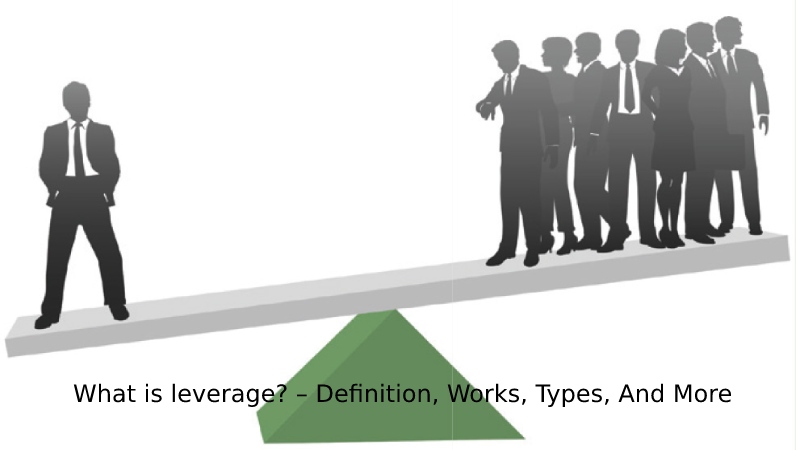Table of Contents
Leverage – Definition
Leverage in an investment policy that involves tapping into borrowed capital to bolster the possible return of an investment. It can be used in business, professional trading, or finance a house. Leverage can also refer to how much responsibility a company uses to fund an asset, known as financial leverage.
While leverage strength increases the returns of an investment, there’s a problem: Should savings not work out, it could also increase the potential risk and loss of investment.
“While leverage can expand returns if someone can earn more on the on-loan funds than what they cost, the opposite is true,” says Robert R. Johnson, a professor of finance at the Heider College of Business at Creighton University. “Leverage [also] expands losses when one earns less on the borrowed funds than [what they] cost.”
How Does Leverage Work
Leverage is when you tap into rented capital to invest in a strength that could potentially boost your reappearance. For example, let’s say you need to buy a house. And to buy that house, your income out a loan. By loaning money from the set, you’re using leverage to buy an asset – which in this case, is a house. Over time, the value of your home can increase.
Entrepreneurs use leverage, such as CEOs of corporations and founders of startups, businesses of all sizes, professional traders, and everyday individuals. Essentially, anyone who has admission to borrowed capital to boost their returns on the investment of an advantage habits leverage.
“When creating a purchase, depositors can combine their equity capital and leverage to expand the affordability of any investment,” says Keith Carlson, CEO and managing partner of Roebling Capital Partners. Leverage also works for investors to bolster their buying power within the market, which we’ll get to later. “Simply put, debt and equity accessibility will always be greater than equity alone; what one can purchase using both will always be more substantial.”
Types of Leverage
Here are four key ways leverage can be used
Financial leverage: A corporate can blow into force by taking out loans or delivering words. This can be extra beneficial for a company that doesn’t consume a lot of properties or wants to duck, having to sell the company’s impartiality to advance the money. And in turn, leverage can be rummage-sale to do
some things: Expand operations, buy inventory, materials, or gear, or kick-start new ventures.
Financial leverage is when a company takes on debt to buy assets that it supposes to produce profits that will exceed the cost of what it lent. Debt-to-income proportion is used to calculate a company’s financial influence to help possible depositors regulate whether the company is a risk or a valuable investment worth making.
“A company can utilize leverage to build shareholder wealth in the business sector. But if it fails to do so, interest expense and the chance of failure destroys the shareholder value” says Jonathan Saadian. The CEO and founder of Initiate. AI. “While it surges the buying power of an investor by permitting them to make increased improvements with more buying power, it also growths the risk of having to cover the loan.”
Leveraged investing
Investors can use leverage to boost their buying power. Expert traders do “buying on margin” to use borrowed funds to have more money to invest. When you buy on the boundary, you can make larger investments with money you borrow with margin books. In turn, it can lead to more significant revenues.
“Investors can use margin to the regulator a larger pool of assets with a smaller amount of money,” says Johnson. “In the stock market, savers can control $100,000 worth of securities with $50,000.”This means you use less of your change. While it mixtures your gains, it can also multiple your losses
However, buying on the border can be a tricky, complex, fast-moving and significant risk. In some belongings, investors may lose far more money than they firstly. “If you try to expand your returns by using leverage. You may not have the financial wherewithal to withstand the interim volatility before the knowledge of your decisions pan out,” says Johnson.
A quick tip: Note that buying on margin is a strategy that’s typically reserved for aggressive, experienced investors, as there’s a significant risk complex. Newer, inexperienced investors are usually advised not to buy on the boundary.
Using leverage for personal finances: While influence is often connected with investing, individuals also use power to make big-ticket purchases. When people revenue loans to purchase an advantage or with the hopes of growing their money in the future, they are using leverage.
Leverage in expert trading: To dramatically increase their purchasing power professional traders often take a more aggressive approach to leverage and take on higher. Levels of borrowed capital for even more significant returns to an everyday investor. For example, if you earn a loan to invest in a side business. The asset you pour into your business helps you make more money than if you didn’t follow your scheme.
 Example of Leverage in Investing
Example of Leverage in Investing
Professional savers often have higher limits on loan capital and don’t go by the exact requirements of non-professionals. Again, the gain and jeopardy are incredibly advancing. This is for the pros with a different level of information depth of experience and comfort level with risk. Let’s say a startup got off the ground with $3 million from angel investors. Should the startup borrow $7 million, there’s now $10 million total to run the business. Furthermore, there’s also a more fantastic opportunity to boost its value to shareholders.
Making Ideas You Can Leverage Online
Some thoughts for making money on the web are just too good to be true. The apparent truth is that these ideas over-promise and under-deliver. Internet marketers display their offers that are more designed to extract money from you rather than help you make it, and many people face the problem of who to trust when it comes to making money online.
However, there are good ways to make money online. These commercial ideas are relatively simple, though some require more skill and knowledge on particular grounds. Yet, for the most significant part, making money online, even if it’s just a few hundred dollars extra per month, isn’t somewhat that’s too problematic to do. As long as you don’t have pie-in-the-sky confidences at the start. You won’t get scorched.
Most people quickly realize around the Net that anything too good to be true frequently is. Still, we’ve been falling for these ploys and tricks far beforehand the Net. Late infomercials that promise you’ll quickly grow rich in real estate or lose weight fast made their rounds for decades ahead. The Net reared its not-so-ugly pate. We often seem to rush headfirst into things that have the odds stacked up in contradiction of us.
Conclusion
Leverage is a standard plan where a person or company uses rented money to invest and possibly grow an investment with the expectation of turning a profit. It uses in several ways to help kick-start or expand a business and to increase shareholder wealth. To buy a home or attend college, or when investing in the stock market. While leverage can improve one’s return, it can also increase the losses of an investment. Understanding the risks involved can help you decide whether using leverage is the right choice for you and your finances and for what types of investments.
Also Read: Perfect Competition – Explaining, Examples, And More

